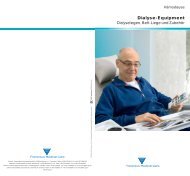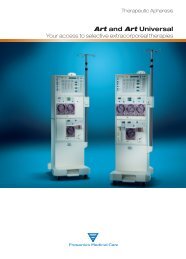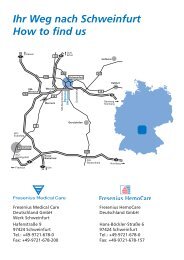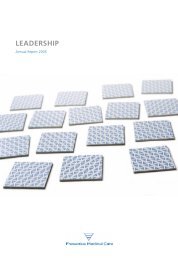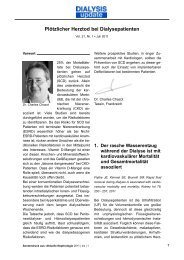Operations and Business Environment - Fresenius Medical Care
Operations and Business Environment - Fresenius Medical Care
Operations and Business Environment - Fresenius Medical Care
Create successful ePaper yourself
Turn your PDF publications into a flip-book with our unique Google optimized e-Paper software.
Quality <strong>and</strong> <strong>Environment</strong>al Management<br />
To ensure constantly high quality st<strong>and</strong>ards, we developed<br />
the Integrated Management System (IMS). It<br />
works with the legal <strong>and</strong> normative guidelines for our<br />
products <strong>and</strong> services <strong>and</strong> focuses on established operational<br />
workflows. The IMS fulfills the ISO 9001:2000<br />
requirements for quality control systems in combination<br />
with the ISO norm 14001:2004 for environmental<br />
control systems. At the same time, it conforms<br />
to the requirements for medical devices of ISO norm<br />
13485:2003.<br />
The IMS has already been implemented in all of our<br />
European production sites <strong>and</strong> will now gradually be<br />
introduced in our dialysis clinics as well. In parallel,<br />
we are constantly refining the system. In 2006, we<br />
introduced the quality control norm ISO 9001:2000 in<br />
about 50 additional European dialysis clinics, including<br />
facilities in Slovakia. As a result, approximately 65 %<br />
of our clinics in Europe are certified, compared to<br />
about 55 % in the previous year. Certification according<br />
to environmental control norm 14001:2004 has also<br />
made headway, <strong>and</strong> now more than 50 dialysis clinics<br />
work in accordance with this norm, including, since<br />
2006, dialysis centers in Pol<strong>and</strong>, Slovenia, Turkey <strong>and</strong><br />
Italy. As planned, we trained a total of 50 employees,<br />
so-called corporate auditors, to perform internal audits<br />
based on the IMS.<br />
Another focus of our work is to prepare drugs for<br />
approval <strong>and</strong> submit the necessary applications. The<br />
approval of drugs is subject to national <strong>and</strong> international<br />
regulations, <strong>and</strong> quality management is in charge<br />
of controlling their internal realization. The aim is to<br />
speed up approval of products to shorten the time<br />
between development, clinical testing <strong>and</strong> marketing<br />
of products.<br />
To meet this goal, the Mutual Recognition Procedure is<br />
particularly important. Valid throughout the EU, this<br />
directive allows for the accelerated approval of medical<br />
products – if they have already been approved by another<br />
EU member state. In 2006, a total of 28 peritoneal<br />
dialysis products were approved, including products<br />
for PD solutions from the balance series (see the glossary<br />
beginning on page 114 ), as well as for dialysis drugs in<br />
Europe <strong>and</strong> Asia.<br />
As previously mentioned in the “Strategy” section on<br />
page 50<br />
, we intend to become more involved in the area<br />
of dialysis drugs in the future. Preparing these drugs<br />
for approval will be a focus of our quality management.<br />
We took the first steps in 2006, adapting, for example,<br />
internal structures <strong>and</strong> processes accordingly.<br />
Apart from introducing the environmental control system<br />
in our clinics, our work focused on the implementation<br />
of the RoHS <strong>and</strong> WEEE EU guidelines. RoHS<br />
st<strong>and</strong>s for “Restriction of the Use of Certain Hazardous<br />
Substances in Electrical <strong>and</strong> Electronic Equipment”.<br />
Since mid 2006, this guideline has limited the usage<br />
of certain hazardous substances in electrical <strong>and</strong> electronic<br />
devices <strong>and</strong> completely forbids the usage of<br />
lead, cadmium <strong>and</strong> quicksilver in these devices. WEEE<br />
st<strong>and</strong>s for “Waste of Electrical <strong>and</strong> Electronic Equipment”.<br />
The guideline regulates collection, disposal<br />
<strong>and</strong> treatment of electronic waste. In 2006, <strong>Fresenius</strong><br />
<strong>Medical</strong> <strong>Care</strong> updated the labeling of products in<br />
accordance with WEEE at its Schweinfurt factory,<br />
among others.<br />
Active environmental protection at our production sites<br />
means continuous improvement of our processes, in<br />
order to be more environmentally compatible <strong>and</strong>,<br />
usually, more cost-efficient. For example, by using heat<br />
recovery systems at our St. Wendel plant we considerably<br />
reduced the amount of steam used <strong>and</strong> thus cut<br />
the amount of natural gas we needed as an energy<br />
source by 4 %.<br />
We were able to reduce the energy consumption at<br />
our factory in Cremona, Italy, by 15 %, simply through<br />
optimizing the use of lighting systems <strong>and</strong> air conditioning.<br />
In addition, logistics costs for truck transports<br />
were cut by 10 % thanks to improved coordination of<br />
transport routes between individual suppliers.<br />
Waste separation has considerably reduced the amount<br />
of residual trash at <strong>Fresenius</strong> <strong>Medical</strong> <strong>Care</strong>’s dialysis<br />
clinics in North America. Waste is now separated in<br />
more than 900 clinics. As a result, we recycled 3,500<br />
tons of cardboard <strong>and</strong> paper packaging in 2006.<br />
Saving water is also an important contribution to resource<br />
conservation. In 2006, we installed more than<br />
80 water preparation systems to produce ultrapure<br />
85<br />
<strong>Fresenius</strong> <strong>Medical</strong> <strong>Care</strong> 2006



